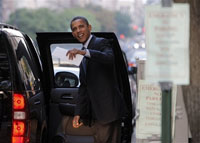Obama tries to win Hillary Clinton’s supporters - women
After Hillary Rodham Clinton lost the race for the Democratic presidential nomination, one of her delegates wanted to send a message. So Mary Beth Pyle wore a Clinton T-shirt to a unity dinner meant to build support for Barack Obama.

Then she pulled it off to reveal an Obama T-shirt underneath - a symbol of her support for the party's new candidate for president.
"We were there to get over it. We had a sip of wine - goodbye, Hillary - and another sip - hello, Obama," said Pyle, chairwoman of the Democratic Party in Mesa County, Colorado.
But many of Clinton's supporters aren't so willing to embrace Obama, at least not yet. Independents and moderate Republican women remain a question mark, too.
So Obama is working fiercely to win their votes.
He has put out a report explaining what his economic plans would mean for women, reinforcing the message with town hall meetings devoted to the subject. He talks frequently about being raised by a single mother, her economic struggles (including a period on food stamps) and her worries about health insurance as she was dying of cancer.
He's hired former Clinton aides, including Dana Singiser as a senior adviser on female voters. His Web site offers a prominent "welcome" to Clinton supporters and an extensive section for women. Aides are planning events nationwide on the 88th anniversary of the day American women won the right to vote.
"They are going to decide the next president," said Anita Dunn, a senior Obama aide. "We believe that he can make a very strong case to the women of this country that he's someone who gets what they go through."
On Monday, Michelle Obama spoke to hundreds of women at a Chicago luncheon and made a point of praising Clinton.
"My husband is a better candidate because of her. My daughters will think of themselves differently because of her," she said.
Michelle Obama also offered a long list of the campaign's efforts to reach women: 3,500 house parties, over 200,000 phone calls, 250,000 post cards to undecided women, nearly 300 groups on the campaign Web site, including "Obama's Mamas," a group of older supporters.
Women are a group that holds potential for Obama - especially suburban married women, who have been swing voters in recent elections.
Men, by contrast, chose President Bush over Democrat John Kerry 55 percent to 44 percent in the last election. The Republicans held an even greater advantage among white men, who favored Bush 62 percent to 37 percent, according to exit polling.
In recent polls, Obama has had a significant edge among women. A Quinnipiac University poll released July 15 found women supported Obama over Republican John McCain, 55 percent to 36 percent. Among men, McCain had 47 percent and Obama 44 percent.
However, Obama hasn't had an advantage among independent women voters, who gave him 45 percent to 42 percent for McCain, well within the margin of error.
Obama also has work to do with some Clinton supporters. A recent poll by The Associated Press and Yahoo News found that just 12 percent of former Clinton supporters say they are excited about Obama.
"I'm not saying these women are bitter ... but they don't understand how to take this devotion and energy and put it behind the candidate who took her away from them," said Susie Tompkins Buell, a prominent Clinton fundraiser with deep reservations about Obama.
She said Obama must demonstrate his respect for Clinton - by working harder to help retire her campaign debt, for instance - and prove that he understands the concerns of female voters.
Obama supporters argue their candidate is more in tune with women's views, pointing out that McCain opposes abortion rights, opposes making it easier for women to sue over unfair wages and doesn't want to require insurance companies to cover birth control. They argue that he would do little to help families pay for insurance and that his economic policies would amount to a continuation of the Bush administration.
McCain supporters counter that his policies would do more for women. They argue a McCain administration would mean families keep more of their money instead of paying it to the government in taxes, while McCain's health plans would minimize government bureaucracy by giving families tax credits to pay for insurance as they see fit.
McCain, an Arizona Republican senator, sees potential among women who are conservative Democrats and independents in states like Pennsylvania and Ohio, states Clinton won by questioning whether Obama was prepared for the White House or whether he understands the economic problems of working-class families.
"There's an opportunity for our campaign to win over the undecided women's vote," McCain communications director Jill Hazelbaker said in an e-mail.
Democratic superdelegate Ruth Rudy of Pennsylvania said that rural parts of her state, that face a struggling economy, should be fertile ground for a Democrat, but many people feel they don't know Obama well enough yet.
He has to prove he can protect America and be a good leader, she said.
"They have to have money to buy gas to get to their jobs. They have to have money to buy food for their children," said Rudy, a past president of the National Federation of Democratic Women.
Several women said Obama's views on abortion or domestic violence definitely matter, but women's support will hinge on a much longer list of topics.
Liz Shirey, director of the Ohio Democratic Women's Caucus, said, "You can't say 'women's issues' anymore, but 'issues important to women."'
Subscribe to Pravda.Ru Telegram channel, Facebook, RSS!




